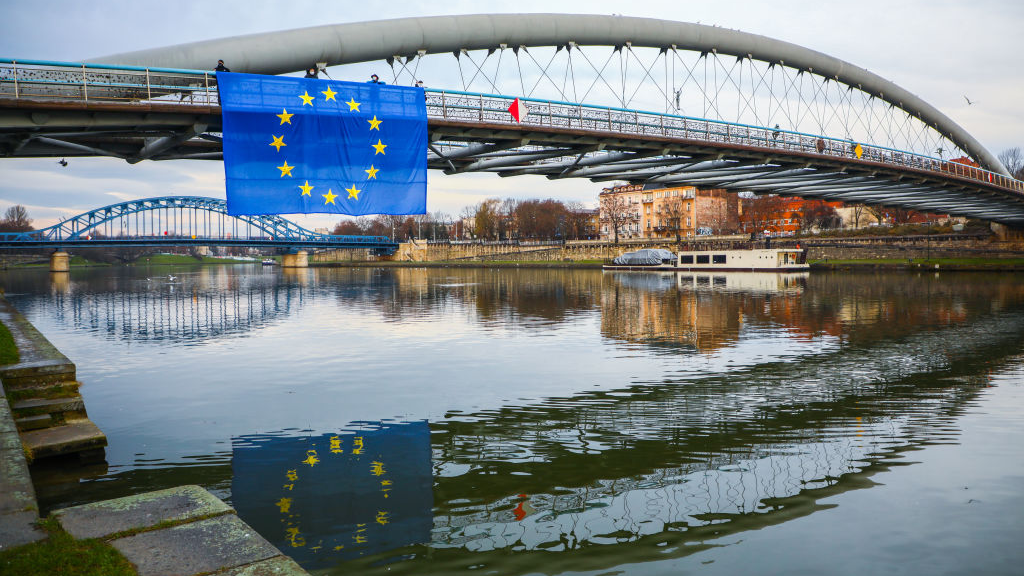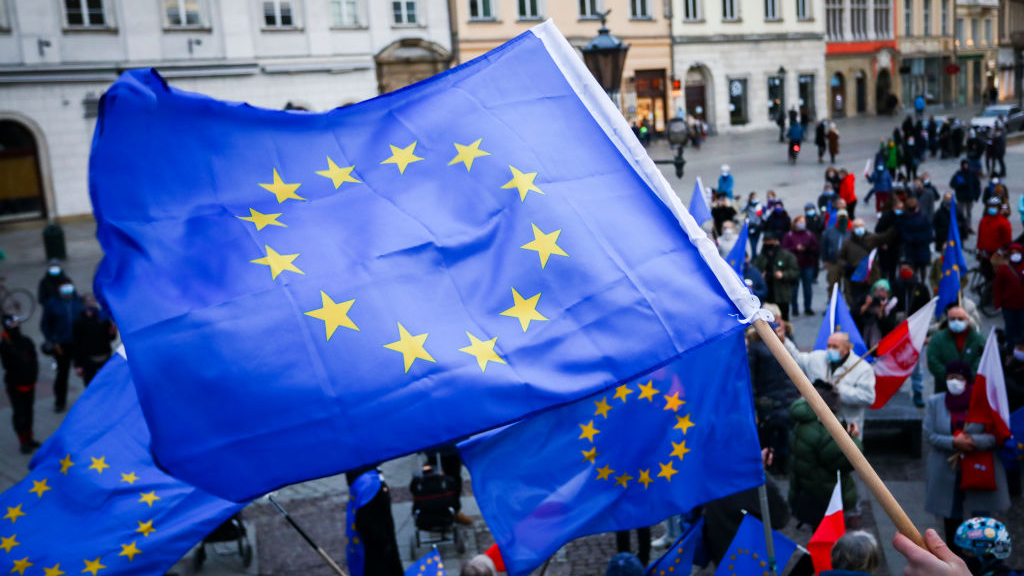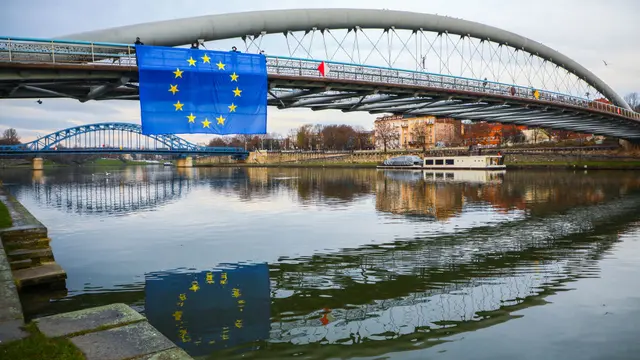
A huge EU flag was hung on Father Bernatek footbridge over Vistula River, as an anti- government happening organized by the members of the Committee for the Defense of Democracy (KOD) to express pro-EU viewpoint in Krakow, Poland, December 5, 2020. /Getty
Editor's note: Andrew Korybko is a Moscow-based American political analyst. The article reflects the author's opinion, and not necessarily the views of CGTN.
Hungary and Poland have threatened to veto the EU's 2021-2027 budget plans because of stipulations threatening to withhold aid to member states which don't abide by Brussels' very strict "democracy" and "rule of law" standards. This places the future of the bloc's 750 billion euro ($909 billion) COVID-19 recovery fund in jeopardy. Those two Central European countries have been criticized over the years for reforming their judiciaries and media, among other changes under their conservative governments, which has caused an interconnected identity and legal crisis within the bloc.
The EU believes that all member states must have the same standards towards these issues, while Hungary and Poland very passionately believe that Brussels is bullying them by forcing them to surrender their precious sovereignty for political reasons in exchange for access to funding. Political scientists might have predicted a scenario of this sort long ago but would have likely been dismissed as speculative if not conspiratorial since it was widely taken for granted at the turn of the century that the EU's members were on an irreversible march towards closer integration according to the liberal paradigm.
The conservative political revolutions in those two countries caught many observers off guard, who afterwards tried to downplay their significance, but to no avail.

People attend "We're staying, we're Europe" demonstration at the Main Square in Krakow, Poland, November 22, 2020. /Getty
There's now no denying that deep socio-political rifts exist between the rest of the EU and Hungary and Poland, the latter of which is currently in the midst of domestic turmoil over a recent controversial court ruling that all but banned abortion in the country.
This shows that neither society is homogeneous, the same as the EU itself isn't, thus adding yet another layer of complexity onto everything. Hungary has also experienced similar, but less large-scale unrest, over the years too.
This controversy is so emotive because both sides accuse the other of politicizing the pandemic, but while they bicker, the bloc's nearly 450 million people remain in dire need of aid.
The resultant deadlock has provoked some politicians into considering unilateral action to bypass Hungarian and Polish opposition to Brussels' socio-political demands.
French Minister for European Affairs Clement Beaune told Le Journal du Dimanche in an interview on December 6 that "a more radical solution" might be undertaken wherein only 25 members receive the bloc's funds, thus leaving Hungary and Poland without access to them.
There would certainly be a radical step but it wouldn't by any means be a "solution" since it would only exacerbate the EU's interconnected identity and legal crises sparked by the conservative revolutions in those two Central European countries which lay at the heart of this dispute. If anything, such a step legitimizes their criticism of Brussels for behaving as a bully and politicizing the pandemic. It would also de facto exclude them from the EU for all practical intents and purposes by punishing them to the point where their people are denied access to much-needed aid despite arguably deserving it without preconditions.
It might be that some Brussels bureaucrats believe that doing so could lead to an intensification of grassroots protests against those two governments' rule that could in turn pressure them into conceding on these issues, but if that's the case, then there's no other way to describe such speculative strategizing than meddling in their domestic political affairs. Thus, one can only hope that Beaune was only bluffing since otherwise the bloc would be at risk of going against everything that it previously claimed to stand for, namely unity and integration among all member states on an equal basis in order to improve the lives of every citizen without exception.
The best possible outcome to break this deadlock would be if Brussels removes its clauses making the release of such funds conditional on abiding by certain "democratic" and "rule of law" standards. Those disputes shouldn't be dismissed because they're very serious and have already run the risk of destabilizing the entire bloc as is presently seen, but they also mustn't be exploited to withhold aid from the Hungarian and Polish people as punishment for their governments' disagreements with the bloc. Their problems should be addressed once the pandemic is finally over, not in the middle of it, otherwise more people will needlessly suffer.
(If you want to contribute and have specific expertise, please contact us at [email protected])
 简体中文
简体中文

